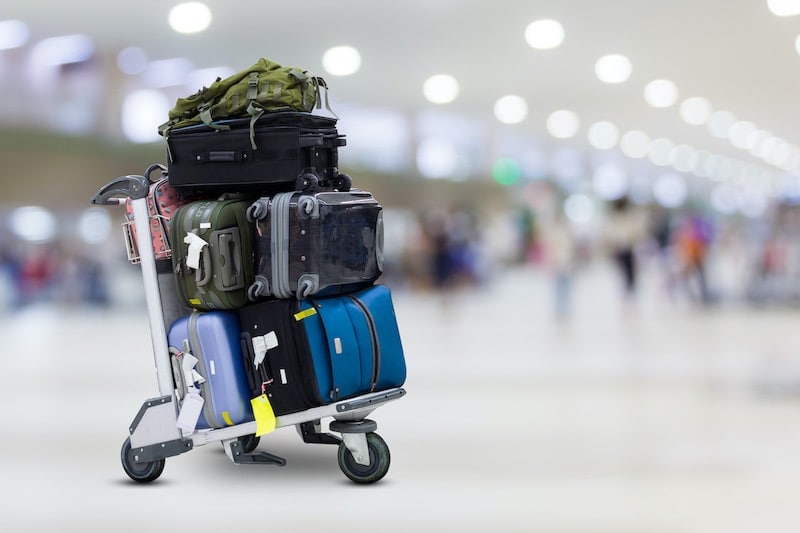Excess Passenger Baggage: How to Handle Costs and Shipping Solutions
فهرست مطالب:
ToggleAir Cargo
If you’re planning a trip and worried about excess baggage at the airport, this guide will walk you through baggage allowances, costs for excess baggage, and the best strategies for minimizing these fees. By the end of this article, you’ll understand how to avoid common baggage issues and enjoy a smooth travel experience. We’ve also compiled a detailed list of baggage policies for major airlines to assist with your planning.
What is Excess Baggage?
Excess baggage refers to luggage that exceeds the weight or size limit set by an airline. This article explores how excess baggage fees are calculated, what varies by airline, and how to manage it cost-effectively. You’ll also learn about passenger freight, a viable option when regular baggage allowances aren’t enough.
Travelers often face the challenge of exceeding baggage limits, especially when carrying personal items along with new purchases. Understanding the baggage policy and planning ahead can save you from expensive fees.
This guide will take approximately 5 minutes to read, providing you with essential tips to avoid unexpected charges and hassle at the airport.
Understanding Baggage Allowances: Plan Ahead
When booking your flight, the baggage allowance should be one of the first things you check. Different airlines have different rules for baggage based on your flight class and destination. Most airlines offer a set limit on the number of kilograms or the volume of baggage each passenger can carry, which is typically noted on your ticket. It’s important to familiarize yourself with these limits to avoid surprises at check-in.
Key Factors Affecting Baggage Allowances:
- Flight Class: Economy class typically has a lower baggage allowance compared to business or first class. However, some airlines offer options to increase your baggage allowance for an additional fee.
- Ticket Type: Your ticket type (e.g., standard or premium) can also influence your baggage limit.
- Domestic vs. International Flights: Many airlines have different baggage policies for international flights, with higher allowances for long-haul travel.
Knowing your baggage limits is crucial for avoiding excess baggage charges. If your bag is heavier than allowed, you will have to pay extra fees, which can add up quickly.
How to Avoid Excess Baggage Fees
While exceeding the baggage limit is a common concern, there are strategies to minimize the costs:
- Pack Smart: Carefully pack your items to avoid exceeding the weight and volume limits. Consider using smaller or lighter luggage.
- Use Carry-on Bags: Most airlines allow one carry-on bag, typically weighing 5 to 7 kg. This can help reduce the weight of your checked baggage.
- Pre-pay for Extra Baggage: Some airlines offer discounted rates for excess baggage if paid in advance. It’s often cheaper than paying at the airport.
Another solution for travelers with bulky or heavy items is freight services. These services allow you to ship your luggage separately from your flight, bypassing the airline’s baggage restrictions.

Excess Baggage Fees: What to Expect
Excess baggage costs can vary significantly depending on the airline and the route. Generally, airlines charge per kilogram of excess weight, but there are some additional fees that can apply for larger items or special baggage like sports equipment.
Here’s a breakdown of some typical excess baggage charges for various airlines:
- Iranian Airlines (e.g., Mahan Air, Iran Air): Fees can range from 1% to 2% of the ticket price per kilogram for excess baggage.
- European Airlines: Excess baggage fees can be as high as $30 per kilogram for flights to and from Europe.
- International Flights: On longer flights, fees can reach up to $50 per kilogram, especially when flying to destinations like Japan or South Korea.
In some cases, these fees can rival the cost of the flight itself, so it’s essential to plan ahead and explore alternatives.
Freight Services vs. Excess Baggage
When your baggage is heavy or oversized, freight services may be a more economical choice than paying for excess baggage. Freight allows you to ship large items like sports equipment or purchases without paying for extra luggage on the plane.
Benefits of Freight Services:
- No Weight or Size Limits: Freight services typically do not have the strict weight or size restrictions that airlines impose on checked baggage.
- Cost-Effective: For large or heavy items, freight may be cheaper than paying excessive baggage fees.
- Seamless Delivery: While it may take longer for your items to arrive, freight services ensure that your items reach your destination safely.
How to Ship Excess Baggage via Freight
If you’re considering using freight services for your excess baggage, you’ll need to follow certain guidelines. Here’s how:
- Choose the Right Service: Select a reputable air freight service that suits your needs. Compare costs and delivery times.
- Prepare Your Items: Ensure your items are securely packed, as freight services often require professional-grade packaging for safety during transport.
- Check for Additional Costs: Freight services might charge for packaging, insurance, and other extras, so be sure to factor these into your cost estimation.
Which Air Cargo Method is Best for You?
When it comes to sending baggage via air transport, there are several methods to choose from, depending on your needs:
- Checked Baggage: This is the most common method for transporting luggage on a flight. It’s typically best for baggage weighing under 30 kg.
- Air Freight: For bulky or oversized items, air freight offers a more affordable and flexible solution. This method is perfect for large household goods, sports equipment, and even pets.
- Cargo Services: Cargo services are ideal for heavy items that don’t need to be transported with the passenger. This option works best for commercial goods or extremely large items.
It’s important to research each option carefully and select the one that offers the best balance of cost, speed, and convenience for your excess baggage.
Baggage Policies of Major Airlines
Here’s a snapshot of baggage allowances for some major airlines:
- Qeshm Air: ۳۰ kg for economy class, 40 kg for business class. Excess baggage fees are calculated at 1% of the ticket price per kg.
- Iran Air: Similar to Qeshm Air, with baggage allowances of 30 kg for economy and 40 kg for business class. Excess baggage is charged per kilogram based on the ticket price.
- Mahan Air: Offers the same baggage limits as Iran Air, with excess baggage fees depending on the route and weight.
For international flights, fees for excess baggage can range from $20 to $50 per kilogram, depending on the airline and destination.
Conclusion: Travel Smart with Proper Baggage Management
Managing excess baggage doesn’t have to be stressful. By understanding your airline’s baggage policies and using smart packing techniques, you can avoid extra costs. For heavy or oversized items, consider using freight services, which can save you money while ensuring safe delivery.
Whether you’re traveling domestically or internationally, knowing how to manage your baggage will lead to a smoother, more affordable journey. Be sure to plan ahead, check baggage limits, and choose the best solution for your needs.
